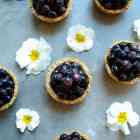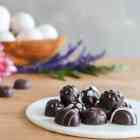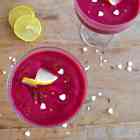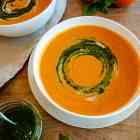Brain Food Essentials :: Blueberries
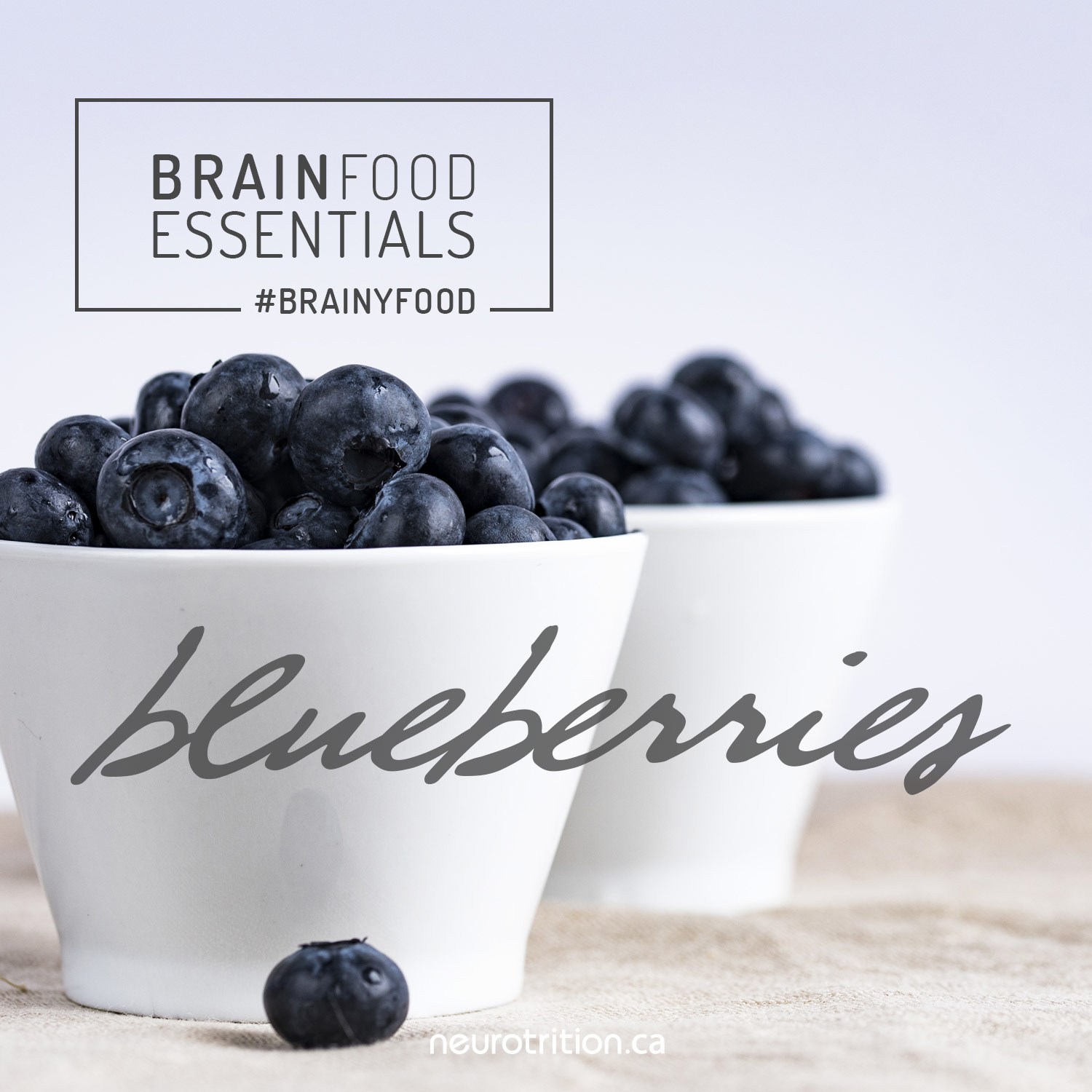
Think blue.
Sometimes, the smallest things can have the biggest impacts. Take blueberries for example. For years we have been reading how blueberries are linked to a vast array of health benefits.
At NeuroTrition, we love blueberries! Did you know they were one of the first foods to earn the title of “superfood?” Research has shown that blueberries support our brain function and health, as well as lower risks of cardiovascular disease and some forms of cancer. But what in this sweet food makes them so super? And how does it work?
Why Blue is Good for You
Before I dig into why it’s good to think blue, let’s check out why blueberries are super nutritious. Blueberries are packed with flavonoids. You may be familiar with some flavonoids, such as resveratrol and anthocyanins. Resveratrol is most commonly known as being the powerful nutrient in red wine linked to low rates of heart disease, a phenomenon called the French Paradox. Well, resveratrol is in blueberries too — for the brain benefit without the buzz.
Anthocyanins, which give blueberries their blue-red colour, are powerful antioxidants that protect structures in our body (from the blood vessels in our brain to the integrity of our skin).
Anthocyanins, which give blueberries their blue-red colour, are powerful antioxidants that protect structures in our body (from the blood vessels in our brain to the integrity of our skin). Research has found that anthocyanins stabilize the collagen matrix (i.e. the strong interlacing structure that makes up the connective tissue in your skin, bones and cartilage) by inhibiting enzymes that slice the collagen matrix. That’s right – these tiny blueberries may help us say “Hello” to healthy blood flow in our body and brain and “Bye-bye” to wrinkles. I love that.
FUN-FACTOID: One cup of blueberries provides 50% of your recommended daily intake of vitamin C, 36% of vitamin K and 25% of manganese, plus 6g of dietary fibre.
A Smart Food Choice
We know blueberries are a smart food choice. However, blueberries deserve more than just a passing thought — because blueberries may actually be able to help our brains age better! Last month, when researchers from the United Kingdom gave an anthocyanin-rich blueberry beverage to two groups of adults (one young, the other old), they found the anthocyanins may promote improved cognitive ability and blood flow in the brain. It’s easy to see why blueberries make it into our NeuroTrition Rx.
Remember…
Oh, dear! What was I talking about?
Our memory can start to fail us, even at a “youthful adult age”. (That’s right! We shall not be referred to as “old”, as youthfulness is enjoyed by those who believe they are — a scientifically backed fact). And blueberries have a unique ability to gain access to the very elusive brain (the blood-brain barrier is not easy to penetrate, so it’s pretty sweet indeed that blueberries’ compounds can get through).
Ptero-What?
Surprisingly, it wasn’t your standard brain nutrients, such as resveratrol or vitamin C, K or manganese in blueberries that were so SO brain-loving. It was pterostilbene! Pterostilbene is a particularly fascinating antioxidant. It is really fat-loving (a.k.a. lipophilic), hence it’s attraction for the brain, which is primarily made of fat. It loves to be in our brains! Pterostilbene is an antioxidant, so it fights free radicals; it also helps keep inflammation in the brain at bay (this is key, as neuro-inflammation is a risk factor for depression and Alzheimer’s disease).
FUN-FACTOID: It’s a natural brain booster! Pterostilbene found in blueberries boosts the brain’s release of dopamine – that’s our motivation neurotransmitter.
Forgetful me!
I almost neglected to mention… inside the brain, pterostilbene concentrates where memory occurs. What is it doing there? Well, researchers at Tufts University took a group of older rats and gave them some pterostilbene. The rats were able to solve mazes faster and better – the pterostilbene improved their memory performance. Think blue – science tells us these little blueberries may reverse deficits that occurred with age in the brain. Watch out Sudoku and Crosswords! We’ll be picking up our game this summer armed with handfuls of delicious blueberries.
FUN FACTOID: Blueberries are not the only source of pterostilbene - it is also present in red wine. Drinking two glasses of red wine contains the same about of pterostilbene given to the rats in the maze study at Tuft’s University. Cheers!
3 Ways to Enjoy Blueberries
Here are some great ideas of how these little blueberries can make an even bigger presence in your diet.
1. Fresh
Summertime is blueberry season. Grab a handful. Delicious! Best fresh, these tiny blue round berries burst with a perfect blend of sweet and tart. Offering maximum nutritious value in their fresh form, whenever possible enjoy fresh blueberries. A great snack by the handful, as a topping on anything from salad to dessert or blended in a smoothie. And, go wild! Not wild as in stuff your face so fast blueberries are flying left, right and center. Eat wild! Wild contain even more nutrients per bite than some conventionally grown blueberries.
2. Or, Frozen?
Don’t give the freezer section the cold shoulder! Frozen blueberries contain just as many great nutrients as fresh blueberries, and at times even more, according to research out of the University of California. When the local produce section is looking a little sad or blueberries are out of season and super pricey, opt for frozen blueberries. I always recommend ones that say they’re “flash frozen” to lock the nutrition in. You can always freeze your own at the peak of their freshness in Summer, so you’ll know they’re brimming with nutrients.
3. Cooked
Blueberry soup may sound strange to some, but it is a traditional Scandinavian snack to warm you up. I’m Hungarian, and sour cherry soup is a Summer favourite in my Old Country — so I’m all for fruit soups (low glycemic ones, like ones made from berries!). This one tastes delicious eaten like a compote with probiotic-rich Greek yogurt for some gut-brain love, too.
BLUEBERRY SOUP
- 3 cups fresh blueberries (frozen works too!)
- 1/4 cup pure maple syrup
- 1 cinnamon stick
- 1 tbsp freshly squeezed lemon juice
- 2 cups water
- Optional: 2 tsp cornstarch, arrowroot or potato starch
Directions:
In a large sauce pan, bring blueberries, maple syrup, cinnamon stick, water and lemon juice to a boil over medium heat. Let boil for about 5 minutes, then remove from heat. If you’d like the mixture to be thicker, mix starch of choice in 1 tbsp of cold water and stir into the soup. Return to heat, bring to a boil and then remove from heat. Let cool for 15-20 minutes. Serve hot or chilled. Delicious with a spoonful of Greek yogurt mixed in. Store leftovers in the fridge for up to 3 days.
I’m so happy to report that these sweet little blue berries are legit brain food, and we’ll continue to build them into our clients’ NeuroTrition Rx fresh, frozen, raw and cooked. Here’s to being blue (well, the colour not the mood).
- References
-
- Chang J., Rimando, A., Pallas, M., Camins, A., Porquet, D., Reeves, J., Shukitt-Hale, B., Smith, M.A., Joseph, J.A., & Casadesus, G. (2012). Low-dose pterostilbene, but not resveratrol, is a potent neuromodulator in aging and Alzheimer’s disease. Neurobiology of Aging, 33(9):2062-2071.
- Harada, N., Zhao, J., Kurihara, H., Nakagata, N., & Okajima, K. (2011). Resveratrol improves cognitive function in mice by increasing production of insulin-like growth factor-I in the hippocampus. Journal of Nutritional Biochemistry, 22(12):1150-1159.
- Poulose, S.M., Thangthaeng, N., Miller, M.G., & Shukkit-Hale, B. (2015). Effects of pterostilbene and resveratrol on brain and behavior. Neurochemistry International, 89:227-233.
- Cutler, B.R., Petersen, C., & Anandh Babu, P.V. (2017). Mechanistic insights into the vascular effects of blueberries: Evidence from recent studies. Molecular Nutrition & Food Research, 61(6).
- Williams, C., G. Dodd, D. Lamport, J. Spencer and L. Butler. (2017). Effects of Anthocyanin-rich blueberries on cognitive function in healthy younger and older adults. Innovation in Aging, 1(1);1362.
- Bouzari, A., Holstege, D., & Barrett, D.M. (2015). Vitamin Retention in Eight Fruits and Vegetables: A Comparison of Refrigerated and Frozen Storage. Journal of Agricultural and Food Chemistry, 63(3):957-962.





